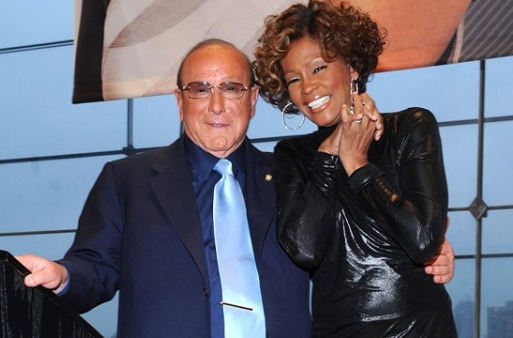Clive Davis finally admitted his all time favorite song last night. At a live interview at the famed Roxy on Sunset in West Hollywood, Davis — promoting his best selling autobiography “The Soundtrack of My Life”– gave in and conceded his top tune ever is Simon & Garfunkel’s “Bridge Over Troubled Water.” He also called Paul Simon “our greatest living songwriter.” Our LEAH SYNDEY was in the audience as music publisher Tom Sturges (also the youngest son of legendary filmmaker Preston Sturges) plied Clive with questions. The VIP crowd included Earth, Wind and Fire’s Verdine White, Producer Howard Rosenman, HBO”s Jeffrey Guthrie and Glenn Whitehead, Barbara Davis, Nikki Haskell and more. Clive spoke for two hours to a rapt crowd in awe of being in the presence of this legend. Here’s a sampling:
TS: How did you get into music?
CD: I got into music totally by love. I lost my parents when I was 18, both within a year of each other. I had no money. I was a freshman at NYU. In those days in Brooklyn you rose about your station by education. I never liked blood so clearly I ruled out being a doctor. So I became a lawyer. I worked for Columbia Records. Then, really overnight, I became the head of Columbia with no music background. I did not know how to read music.
TS: What is the most creative part for you?
CD: The most creative part is the discovery. You have to make a judgment of what the essence of an artist is. Seeing a number or artists or listening to so many songs that could be candidates for a hit. There are a lot of them that almost make it, but not quite. I call them the 7 1/2’s. As opposed to 8 and above. There are three goals in looking back or forward. One is all all the many artists that I’ve discovered that I’m so proud of; many are in the Hall Of Fame. The second is, will the song be a standard for years to come? And the third is the Icons that you never want their careers to end.
TS: One of the themes of your book is re-invention. What guides you as you guided them?
CD:Dionne Warwick, Rod Stewart, Aretha Franklin, all of them reinvented themselves. We’re in a funny business. When an artist really gets the idea of believing that a career does not have to die, it can go on. For example, Rod Stewart’s ‘Great American Songbook,’ all of them. When I sign artists, I respond to the challenge.
Of course, Sturges asked about Whitney Houston.
CD: That was the most painful chapter to write. I first saw her in 1983. My belief in her was from the beginning. We bonded right away. Her first album sold 22 million, her second 23 million. With Whitney, picture a workhorse. Not the Whitney you read about it in the tabloids. She worked hard; she loved music and knew everything out there. I would often say to her, ‘are you pinching yourself?’ I knew that her success was so unpredictable and atypical. I saw her three days before her passing; she played for me the music she was doing for ‘Sparkle.’ She had no idea she was flirting with death. I did know about her drug problems. I told her the power of drugs is lethal and that you will never survive it, no one does. I feel like I am the keeper of her musical flame. I wrote about the great memorable periods as well as the pain of a very good woman who could not deal with the drug issue. We all knew that she was the best singer in the world. I am the preserver of her flame.

